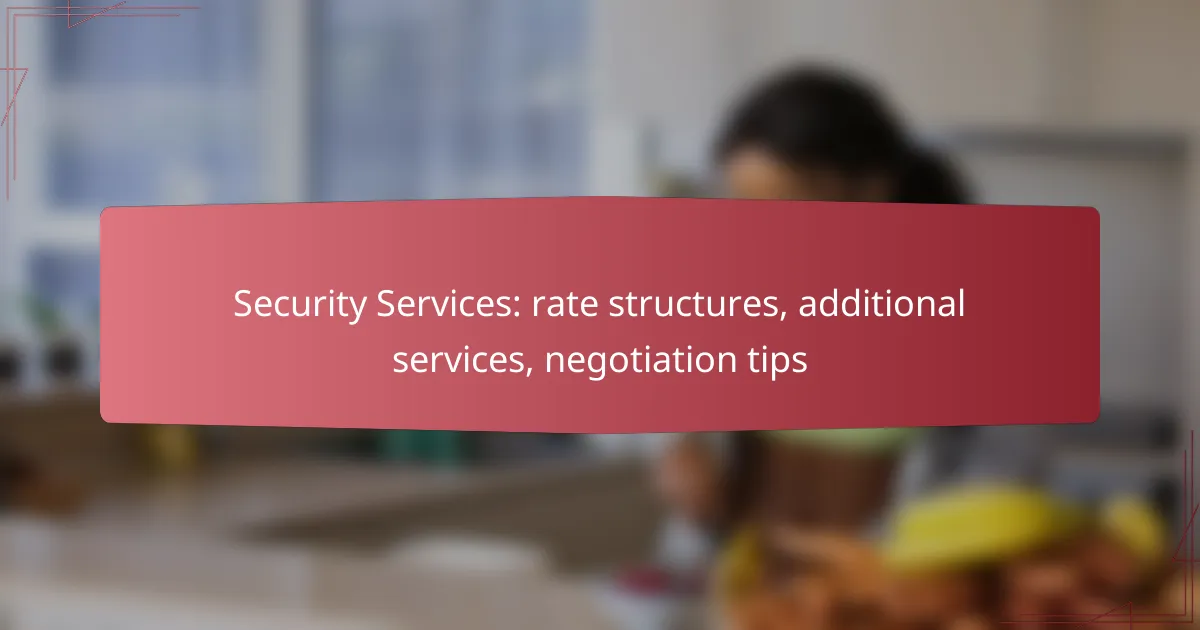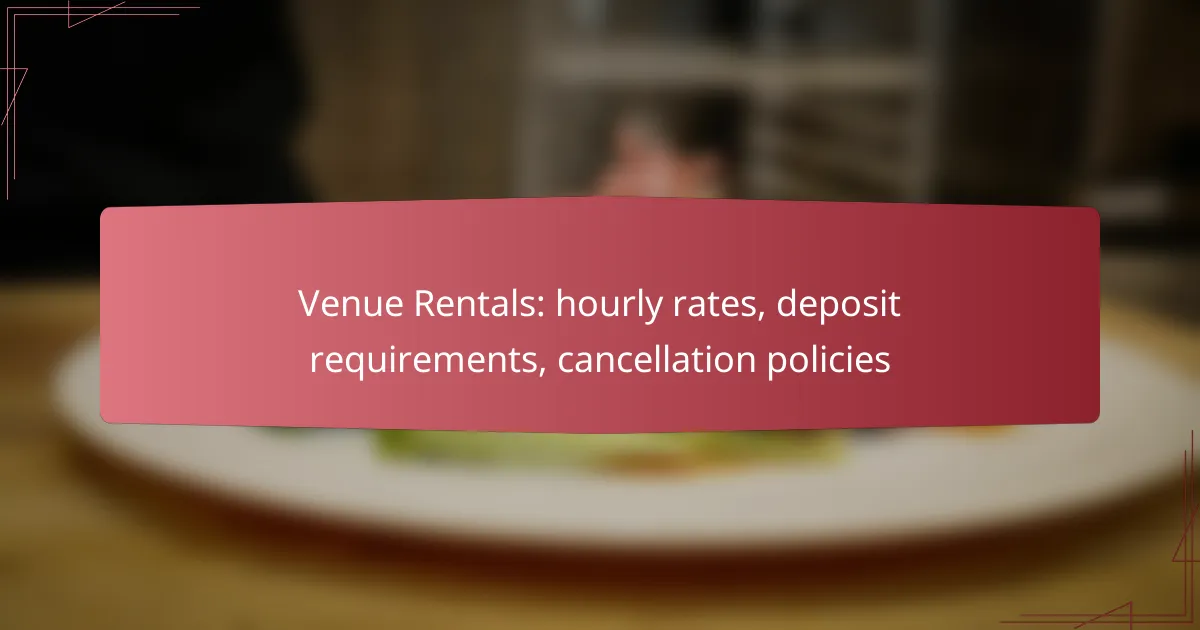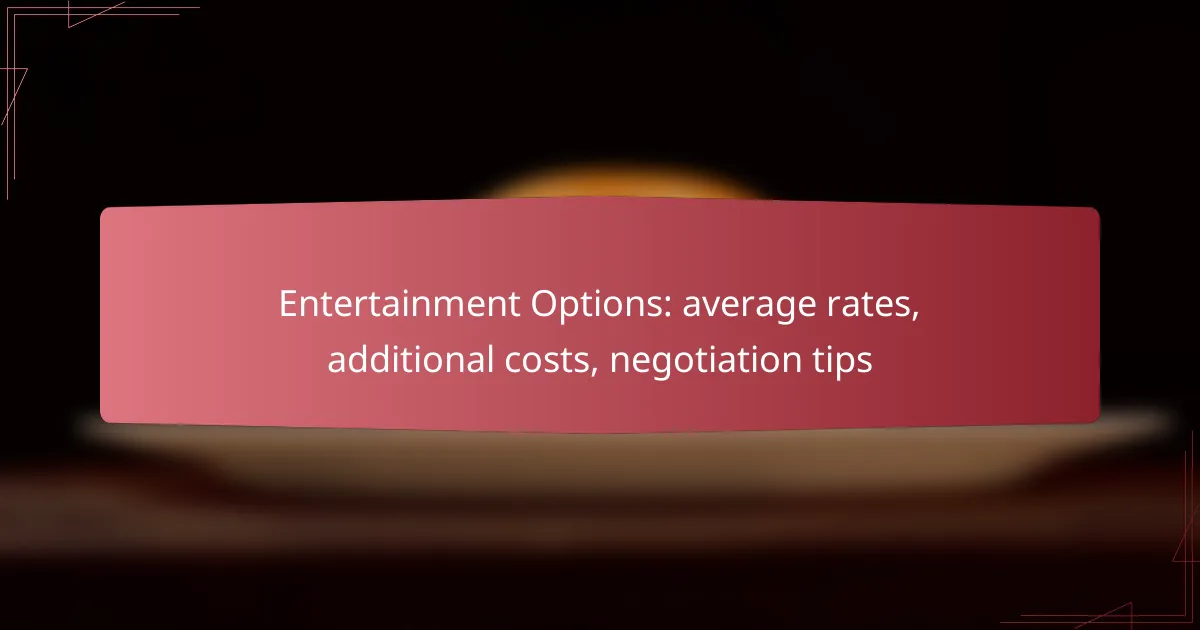Understanding the rate structures for security services is crucial for making informed decisions. In London, hourly rates for security personnel can range from £10 to £25, with variations based on service type and duration. Additionally, many companies offer supplementary services such as mobile patrols and event management, which can be customized to enhance security. When negotiating rates, it’s important to research market prices and clearly communicate your specific needs to achieve the best agreement.

What are the rates for security services in London?
Rates for security services in London vary significantly based on the type of service, duration, and specific requirements. Generally, you can expect hourly rates for security guards to range from £10 to £25, while monthly contracts may offer different pricing structures based on the level of service and commitment.
Hourly rates for security guards
Hourly rates for security guards in London typically fall between £10 and £25, depending on factors such as experience, qualifications, and the nature of the assignment. For instance, unarmed security personnel may charge less than those with specialized training or armed security roles.
It’s common for agencies to have minimum booking times, often around 4 hours, which can affect overall costs. Always clarify the total expected hours and any additional fees before finalizing arrangements.
Monthly contracts pricing
Monthly contracts for security services in London can range from £1,500 to over £5,000, influenced by the number of guards, their expertise, and the specific services required. Longer-term contracts often provide cost savings compared to hourly rates.
When considering monthly contracts, evaluate the services included, such as patrols, monitoring, and emergency response. Some companies may offer discounts for longer commitments or bundled services.
Factors affecting pricing
Several factors influence the pricing of security services in London, including the type of security required (e.g., event security, corporate security), the level of risk associated with the site, and the time of day services are needed. Night shifts or high-demand periods may incur higher rates.
Additionally, the reputation and experience of the security company can significantly impact costs. Established firms with a proven track record may charge more but often provide higher quality and reliability. Always compare multiple quotes and consider the value offered, not just the price.
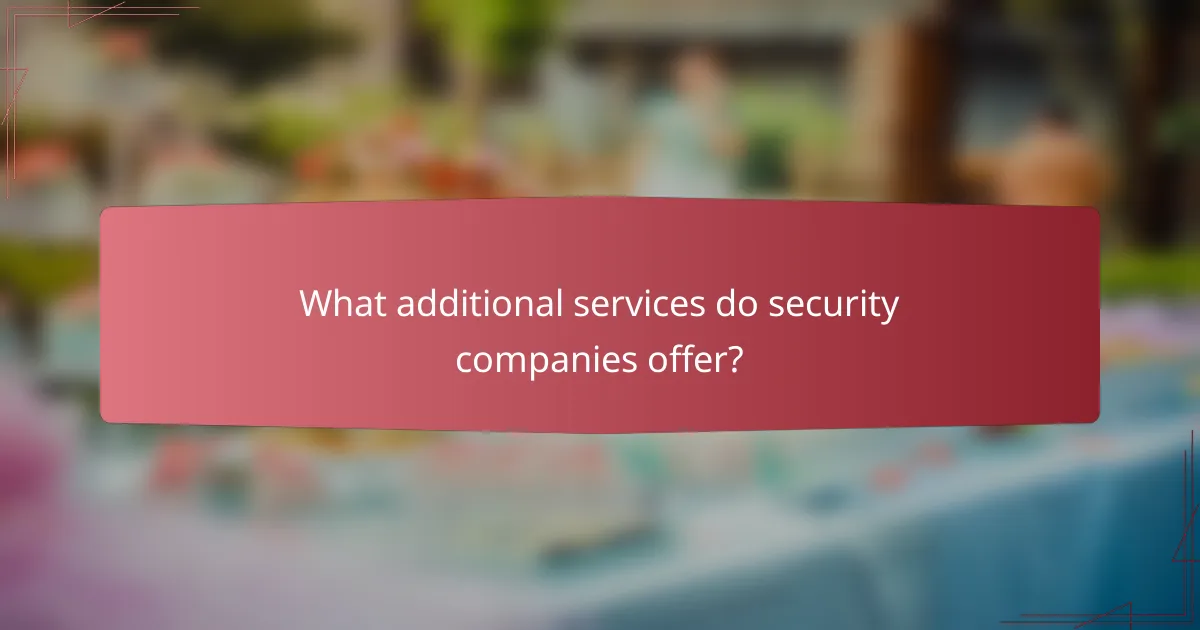
What additional services do security companies offer?
Security companies provide a variety of additional services beyond standard security personnel, including mobile patrols, event management, and alarm response. These services enhance overall safety and can be tailored to meet specific client needs.
Mobile patrol services
Mobile patrol services involve security personnel patrolling designated areas in vehicles or on foot. This service is particularly effective for monitoring large properties, such as shopping centers or industrial sites, where constant surveillance is impractical.
When considering mobile patrols, evaluate the frequency and timing of patrols. For example, some businesses may require patrols during high-traffic hours or overnight. Costs can vary, typically ranging from $30 to $60 per hour, depending on the service provider and location.
Event security management
Event security management focuses on ensuring the safety of attendees at gatherings such as concerts, corporate events, or festivals. This service includes planning, staffing, and coordinating security measures tailored to the event’s size and nature.
Key considerations for event security include crowd control, access management, and emergency response planning. It’s advisable to start discussions with security firms well in advance, as rates can range from $25 to $100 per hour per guard, depending on the event’s complexity and location.
Alarm response services
Alarm response services provide rapid reaction to security alarms triggered at a property. This service typically includes monitoring alarm systems and dispatching security personnel to investigate alerts.
When selecting alarm response services, consider the response time and the provider’s protocols for handling various situations. Many companies offer response times within 5 to 15 minutes, which can be crucial for preventing theft or damage. Costs usually range from $15 to $30 per response, depending on the contract terms and the provider’s reputation.
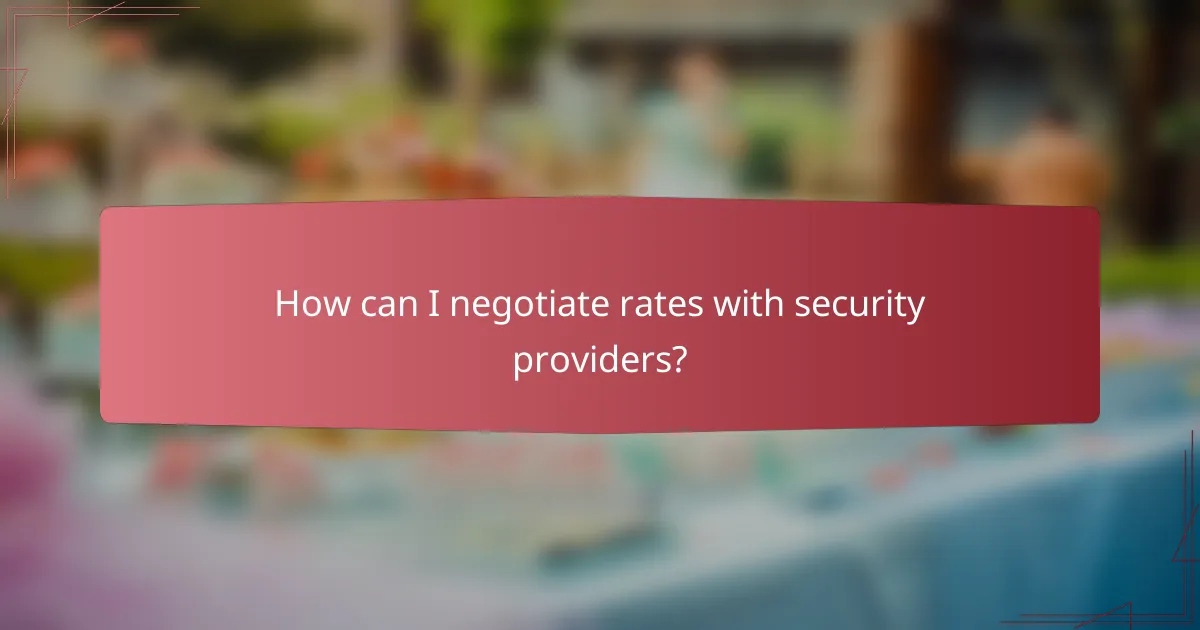
How can I negotiate rates with security providers?
Negotiating rates with security providers involves understanding your needs, the market rates, and the services offered. Start by researching typical costs in your area and be prepared to discuss your specific requirements to find a mutually beneficial agreement.
Tips for effective negotiation
Begin by clearly defining your security needs, including the type of services required and the duration of service. This clarity will help you communicate effectively with providers and set realistic expectations.
Research local market rates for security services, which can vary significantly based on location and service type. For instance, hourly rates for security personnel might range from $15 to $50, depending on experience and the complexity of the assignment.
Consider bundling services to negotiate a better rate. For example, if you need both on-site security and monitoring, ask for a package deal that could lower the overall cost.
Common negotiation pitfalls
A common mistake is failing to do adequate research on market rates, which can lead to overpaying for services. Always compare quotes from multiple providers to ensure you are getting a competitive price.
Another pitfall is not being clear about your needs. Vague requests can result in providers offering services that do not align with your requirements, leading to dissatisfaction and potential additional costs.
Lastly, avoid making decisions too quickly. Take the time to evaluate offers and consider the long-term implications of your choice, including the provider’s reputation and reliability. This careful approach will help you secure a better deal and a more satisfactory service experience.
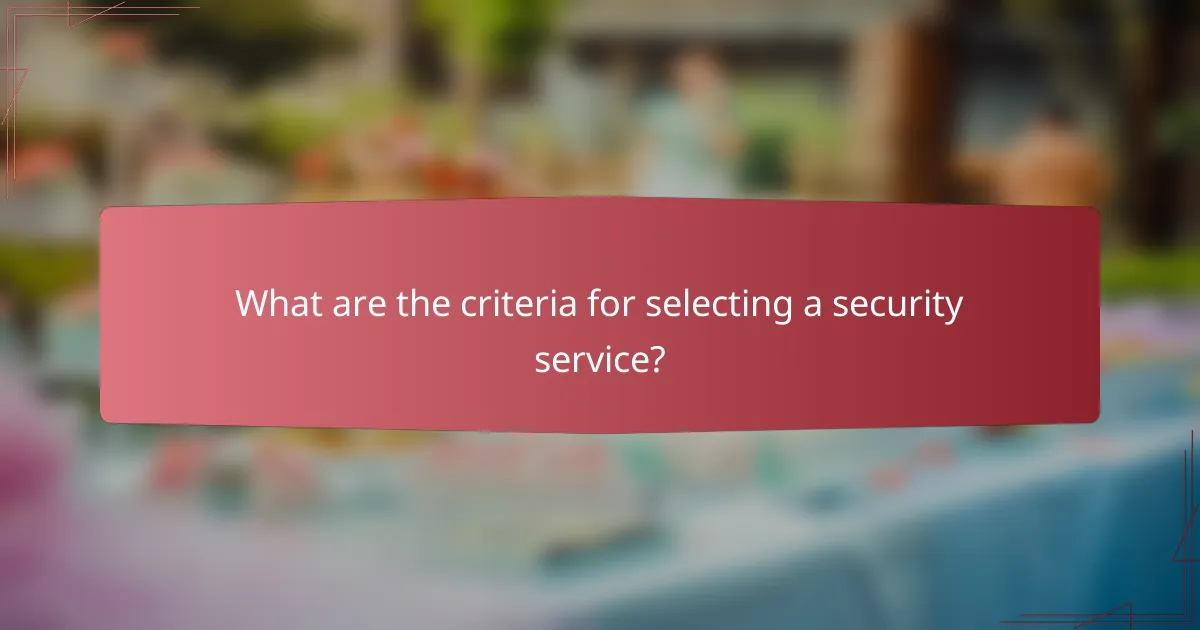
What are the criteria for selecting a security service?
When selecting a security service, key criteria include licensing, industry experience, and the range of services offered. These factors help ensure that the chosen provider meets legal standards and is capable of addressing specific security needs effectively.
Licensing and certifications
Licensing and certifications are crucial indicators of a security service’s legitimacy and professionalism. In many regions, security companies must hold specific licenses issued by local or national authorities, which often require background checks and adherence to industry standards.
Additionally, certifications from recognized organizations can demonstrate a company’s commitment to best practices. For example, certifications like the ISO 9001 for quality management or the ASIS International certifications can enhance credibility and trustworthiness.
Experience in specific industries
Experience in specific industries is vital when choosing a security service, as different sectors have unique security challenges. For instance, a security provider with a background in retail may be more adept at handling theft prevention, while one experienced in healthcare may understand patient privacy regulations better.
When evaluating potential providers, consider asking for case studies or references from similar businesses. This can provide insight into their expertise and effectiveness in addressing industry-specific security concerns.
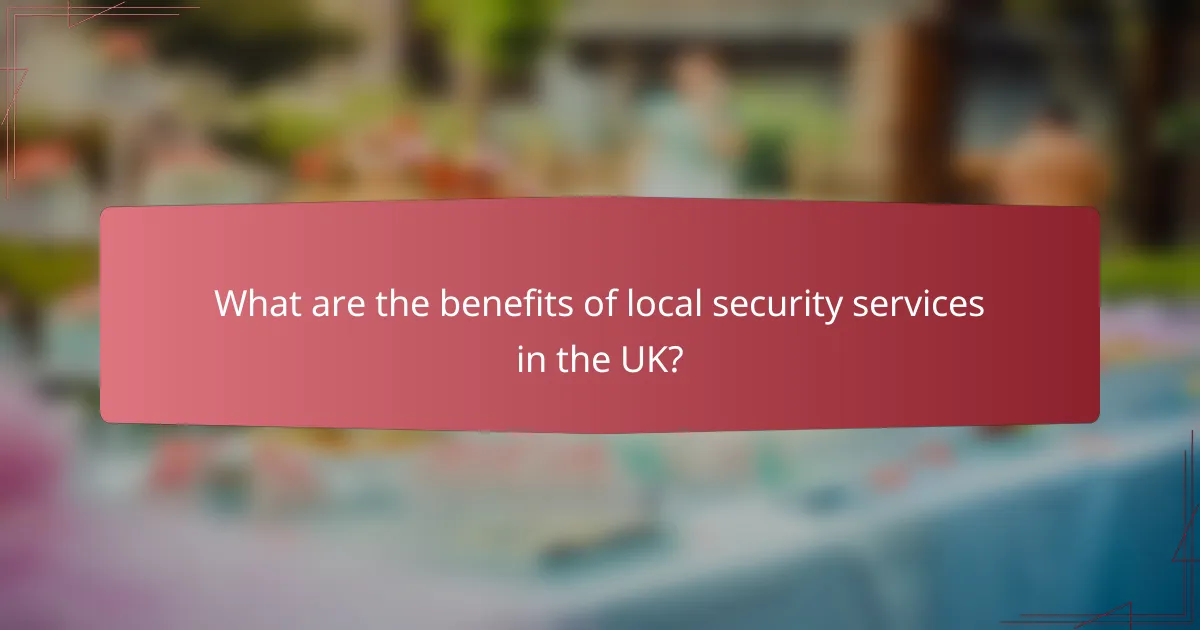
What are the benefits of local security services in the UK?
Local security services in the UK offer tailored protection that aligns with community needs, ensuring a safer environment. Their knowledge of the area, regulations, and potential threats enhances their effectiveness in safeguarding properties and individuals.
Familiarity with local regulations
Local security services are well-versed in the specific regulations and laws governing security operations in their area. This familiarity helps them ensure compliance with legal requirements, such as licensing and operational standards, which can vary significantly across different regions in the UK.
For instance, security firms in London may need to adhere to stricter regulations compared to those in rural areas. Engaging a local service means they can navigate these complexities efficiently, reducing the risk of legal issues for clients.
Quick response times
One of the primary advantages of local security services is their ability to respond swiftly to incidents. Proximity to the site allows for quicker deployment of personnel, often within minutes, which is crucial in emergency situations.
For example, a local security team can reach a disturbance or alarm activation faster than a national firm based further away. This rapid response can significantly mitigate potential damage or loss, providing peace of mind to clients.
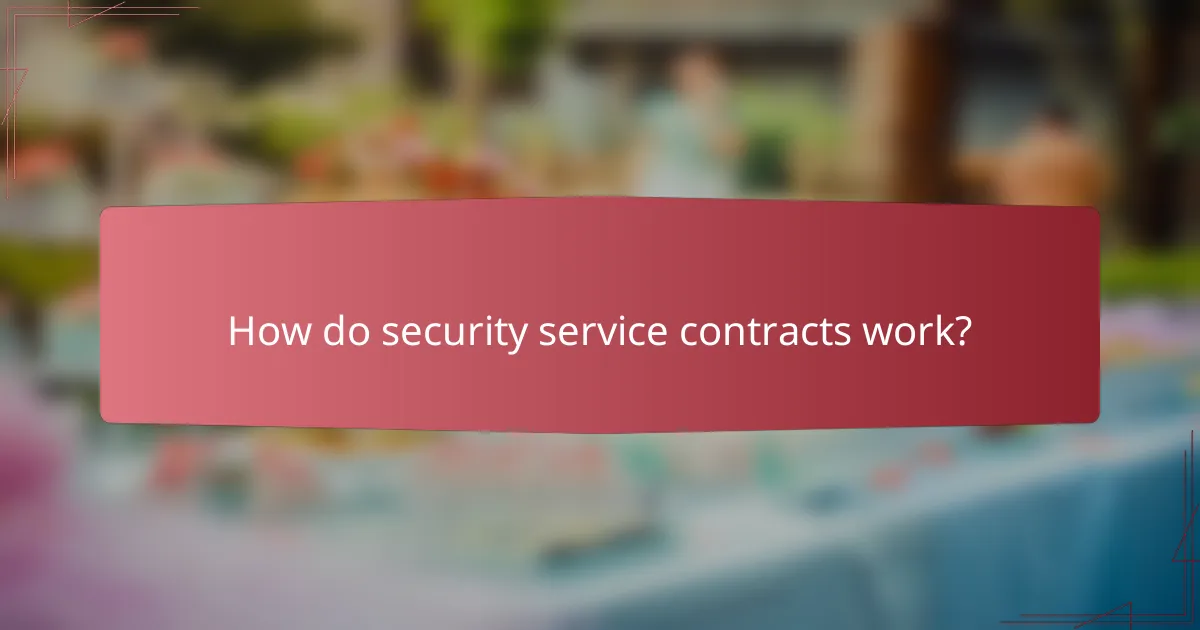
How do security service contracts work?
Security service contracts outline the terms and conditions under which security services are provided. These agreements typically detail the scope of services, payment structures, and responsibilities of both parties involved.
Understanding contract terms
When entering into a security service contract, it is crucial to comprehend key terms such as service scope, duration, and payment schedules. Contracts often specify whether services are billed hourly, monthly, or annually, and may include provisions for overtime or additional services.
For example, a contract might state that basic security services are provided at a flat rate of $30 per hour, while specialized services, like armed security, could cost $50 per hour. Understanding these distinctions helps in budgeting and ensures clarity on what is included in the service.
Cancellation policies
Cancellation policies in security service contracts dictate the conditions under which either party can terminate the agreement. Common practices include requiring written notice a certain number of days in advance, often ranging from 30 to 90 days, to avoid penalties.
It’s essential to review these policies carefully, as some contracts may impose cancellation fees or require payment for services rendered up to the cancellation date. Being aware of these terms can prevent unexpected costs and facilitate smoother transitions if services are no longer needed.
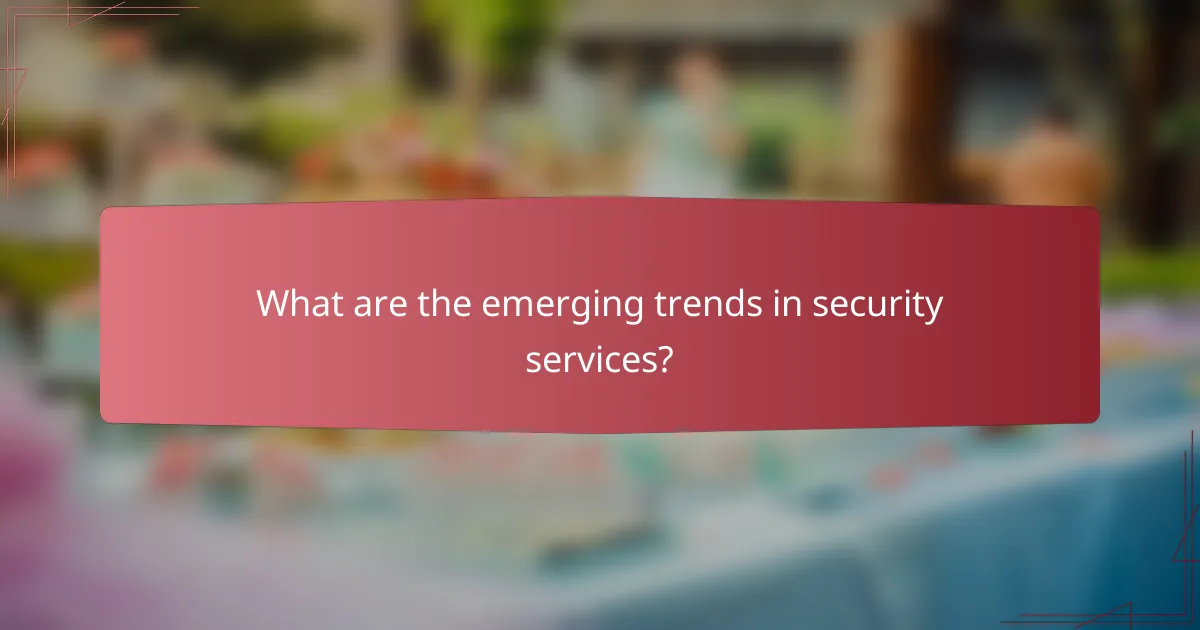
What are the emerging trends in security services?
Emerging trends in security services focus on enhanced technology integration, personalized solutions, and proactive risk management. These trends reflect a shift towards more efficient, adaptable, and comprehensive security measures that meet evolving threats.
Integration of technology in security
The integration of technology in security services is transforming how security is managed and delivered. This includes the use of advanced surveillance systems, artificial intelligence for threat detection, and mobile applications for real-time monitoring and communication.
For example, many security firms now employ smart cameras that utilize facial recognition and analytics to identify potential threats. Additionally, mobile apps allow clients to access live feeds and receive alerts, enhancing their ability to respond quickly to incidents.
When considering technology integration, evaluate the costs versus the benefits. While initial investments may be significant, the potential for reduced manpower costs and improved response times can lead to long-term savings. Ensure that any technology adopted complies with local regulations and standards to avoid legal issues.
